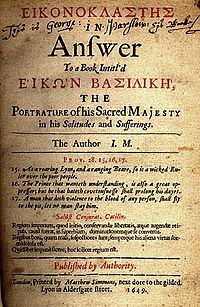Eikonoklastes facts for kids
Eikonoklastes is a book written by John Milton. It was published in October 1649. The book's name comes from Greek words and means "icon breaker." It was written to explain and defend why Charles I was executed on January 30, 1649.
The title also refers to another book called Eikon Basilike, which means "icon of the King." This Royalist book was published right after Charles I's execution. Milton's Eikonoklastes was created to argue against the Royalist ideas and support the Parliamentary side.
Contents
Why was Eikonoklastes written?
John Milton was asked by the new government, the Commonwealth, to write Eikonoklastes. This book was meant to be the official argument from the government.
Another book, Eikon Basilike, was published right after King Charles I was executed. This book made the king seem like a hero or a "martyr." It was very popular, with 35 different versions printed in just one year! Eikon Basilike wanted people to feel sorry for the king and turn against the new government.
Milton's book, Eikonoklastes, took a different approach. Instead of trying to make people feel emotional, Milton used strong arguments. He tried to answer each point made in Eikon Basilike. Milton believed that Eikon Basilike created a false image of the king. He wanted to break that image with the truth.
Eikonoklastes was first released in English in October 1649. It was made bigger in 1650 and soon translated into Latin and French.
What did Eikonoklastes say?
Milton started his book by saying he wrote it because he was asked to, and he did it for the good of the country. A main idea in Eikonoklastes is that all kings can become tyrants. A tyrant is a ruler who uses power unfairly or cruelly.
Milton argued against Charles I's idea of freedom. Charles I thought freedom meant enjoying what you earn and following laws you agreed to. But Milton said Charles I actually forced the English people to become his "slaves." He did this especially by using his power to stop laws, making himself seem above all other laws.
Milton also criticized Charles I's writing style in Eikon Basilike. He even joked that the whole book might just be a "piece of poetry." Milton also defended the English language. When Charles I used the word "demagogue" (a leader who gains power by appealing to emotions), Milton said the king couldn't just invent English words like he could make money.
Milton also changed a quote on the title page from an ancient Roman writer named Sallust. This quote talked about abuses of power. Milton used it to suggest that all kings could be corrupt.
Main ideas in the book
Milton argued that kings can easily enslave their people. He had made this point before in another book, The Tenure of Kings and Magistrates. Milton believed freedom meant more than just owning property. It also meant being safe from a king's unfair rule.
Kings were not the only important topic for Milton in Eikonoklastes. He also supported presbyterian and republican ideas. He said that religious reform could not happen under the control of bishops or kings. Instead, a presbyterian-based religion was the right kind.
Milton started connecting his writings to a future long poem he planned to write, Paradise Lost. In Eikonoklastes, he drew comparisons between King Charles I's rule and Satan's rule in hell. For example, Milton said that anti-Christian kings use confusing language to gain power. This is similar to how Satan uses tricky words in Paradise Lost. Also, Charles I's followers were compared to demons in hell who drink and say bad things.
How was the book received?
Many people think Eikonoklastes did not fully succeed in arguing against Eikon Basilike. However, experts still discuss what Milton's real goal was with the book. Even so, Eikonoklastes was the first of Milton's works to be widely read. Public opinion still largely supported Charles I, but the book reached more people than many of Milton's earlier writings.
After the king returned to power in 1660, Milton and other republicans faced a government that wanted revenge. Eikonoklastes was seen as a book that supported killing kings. On August 29, 1660, a law called the Act of Oblivion was passed. Milton was not sentenced to death for his part in Charles I's execution.
However, the king ordered that Eikonoklastes and another of Milton's books be burned. These books were publicly burned by the public hangman. But this did not stop people from reading Eikonoklastes. A new version was printed in 1690, after the Glorious Revolution.
Images for kids
 | Bayard Rustin |
 | Jeannette Carter |
 | Jeremiah A. Brown |



